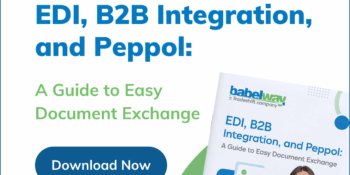Belgium’s B2B e-Invoicing mandate: The countdown to January 2026

By Ioana Ploesteanu
Senior Product Marketing Manager
Tradeshift
About the Author
As part of the Product team, Ioana Ploesteanu partners with marketing and engineering to craft the positioning and lead user engagement strategies for e-Invoicing compliance and AI-driven capabilities.
Navigating the upcoming changes to Belgium’s tax landscape and preparing your business for compliance
From January 1, 2026, all VAT-registered businesses in Belgium will be required to issue and receive e-invoices for domestic B2B transactions. Relying on traditional methods like PDFs sent by email or paper invoices will no longer be an option for mandated transactions.
For project managers, tax managers, and IT specialists, the looming deadline means it’s time to act. The good news? This transition can be a catalyst for greater efficiency and a more resilient financial workflow. This article breaks down the key requirements, looks at what’s coming next, and explains how Tradeshift, a certified Peppol Access Point and a key partner in Belgium’s e-invoicing infrastructure, can help you get compliant and unlock a competitive advantage.
👉 Still trying to figure out how to handle your connection to Peppol? Read our Peppol guide created for IT Managers, EDI specialists, and business leaders.
What are the e-Invoicing requirements for January 2026 in Belgium?
Belgium’s e-invoicing mandate is built on a simple but powerful principle: to create a standardized, machine-readable format for every business-to-business transaction. The new rules, laid out in the Federal Law of February 6, 2024, and further detailed by a Royal Decree published on July 8, 2025, leave no room for ambiguity.
The central pillar of this mandate is the Peppol network. While businesses can agree to use other methods that comply with the EN 16931 standard, Peppol BIS 3.0 is the officially recommended and default format for all domestic B2B exchanges. This means that every VAT-registered business in Belgium must have the technical capability to send and receive invoices via a Peppol Access Point.
Here’s a closer look at what this means for your business:
- Goodbye, unstructured invoices: Paper, PDFs, and simple email attachments will no longer suffice for mandated B2B transactions. These formats are considered “unstructured” because the data within them is not easily readable by a computer, requiring manual data entry or complex optical character recognition (OCR) technology.
- Hello, structured data: A structured e-invoice is a data file, typically in an XML format, that contains all the invoice information in a predefined, machine-readable structure. This allows systems to automatically process the invoice, from receiving to posting, without any human intervention. This is the key to unlocking automation and speeding up your financial cycle.
- The Peppol network’s role: Peppol is not a centralized platform. It’s a secure, global network based on a four-corner model. Think of it like a telecommunications network: you and your trading partner can use different service providers (in this case, different Peppol Access Points), but you can still seamlessly exchange documents with each other. This model guarantees interoperability, which is essential for a nationwide mandate.
To encourage early adoption, the Belgian government is offering a 120% tax deduction on e-invoicing software purchases for small and medium-sized enterprises (SMEs) and self-employed individuals. On the flip side, the penalties for non-compliance are significant, with fines ranging from €1,500 for a first offense to €5,000 for a third offense. These measures highlight the government’s commitment to ensuring a successful and widespread transition.
How Belgian SMBs can prepare for the 2026 e-Invoicing mandate with Babelway, a Tradeshift B2B integration tool.
What will come next in Belgium: e-Reporting for January 2028?
The January 2026 mandate is just the first stage of Belgium’s digital tax transformation. This phased approach is a key part of the larger VAT in the Digital Age (ViDA) initiative proposed by the European Commission, which aims to standardize and modernize VAT reporting across the EU.
For businesses in Belgium, the next step will be the implementation of mandatory real-time e-reporting, scheduled for January 2028. While the specific details are still being finalized, this phase will likely require businesses to transmit transactional data directly to the tax authorities in real-time or near real-time. This provides governments with a continuous, accurate view of economic activity, making it easier to identify and prevent tax fraud.
For a large enterprise, this dual-phased rollout means that a piecemeal compliance strategy simply won’t work. The ideal solution is a platform that can handle both the current e-invoicing mandate and the future e-reporting requirements with agility. The solution you choose today should be scalable, secure, and ready for future changes, whether they are in Belgium or elsewhere in the world.
Why Tradeshift is your ideal compliance partner
The upcoming mandate is a significant undertaking, but with the right partner, it can be a smooth and even beneficial process. Tradeshift is uniquely positioned to help your business navigate this transition.
- A Certified Peppol Access Point: Tradeshift has been a certified Peppol Access Point and SMP since 2014. We don’t just provide technology; we are a core part of the Peppol ecosystem.
- Powering Belgium’s infrastructure: Our long-standing partnership with the Belgian government is a testament to our reliability. Tradeshift’s technology is the engine behind Mercurius, the Belgian government’s official e-invoicing platform, and the one used by Luxembourg. This means our platform is not just compliant; it is trusted at the highest level to handle mission-critical public-sector processes.
- Global Compliance Expertise: Tradeshift provides e-invoicing compliance in 69 countries, including real-time tax clearance models in 12 countries. We have a proven track record of helping some of the world’s largest companies navigate complex regulations, from Latin America to Asia and across Europe. Our platform is built for global compliance, providing a single solution for all your e-invoicing needs.
This Belgian mandate is an opportunity to move beyond basic compliance and transform your financial operations. Companies that act now will not only avoid disruption but also gain the benefits of automation, faster payments, and better cash flow visibility.
Choose a platform, like Tradeshift, that is suitable not just for compliance in Belgium, but transforms your finance operations, especially if you are running a large enterprise.
If you are running a small or medium business using Babelway directly, our B2B integration tool is the right choice for you.
You may also be interested in
Why EU businesses can’t ignore e‑Invoicing anymore
How ViDA is reshaping European invoicing compliance under the hood. All signs point to one message: e‑invoicing is inevitable. The EU’s ViDA directive mandates that digital invoicing becomes the default across the bloc. Countries are already phasing in national mandates (France, Belgium, Poland, Romania, Germany, Spain), and from 1 July 2030, intra‑EU B2B transactions must use structured e‑invoices.
EDI, B2B Integration, and Peppol: A Guide to Easy Document Exchange
The digital age has transformed the way businesses exchange documents. Electronic Data Interchange (EDI) has emerged as a cornerstone for efficient and accurate data exchange, enabling the seamless transmission of various business documents, from despatch advice and order acknowledgements to purchase orders and electronic invoices.
How Belgian SMBs Can Prepare for the 2026 E-Invoicing Mandate with Babelway
Starting January 1st, 2026, all VAT-registered businesses in Belgium will be required to issue and receive structured electronic invoices for B2B transactions via Peppol. Paper and PDF invoices, even if sent via email, will no longer be legally accepted. This move is part of Belgium’s commitment to fight VAT fraud, accelerate digital adoption, and align with the EU’s VAT in the Digital Age (ViDA) strategy.
Belgium’s e-Invoicing mandate: Are you compliance-ready?
Belgian businesses are about to experience a significant change in invoicing practices. Following a growing European trend towards digital tax reporting (notably the adoption of the ViDA framework), a mandatory e-invoicing compliance regulation will be implemented in 2026 via the Peppol network. This initiative aims to modernize invoicing, improve tax compliance, and reduce fraudulent activity. This change presents both challenges and opportunities for financial and IT leaders. Understanding the upcoming e-Invoicing requirements and preparing in advance will be crucial for a smooth transition.



